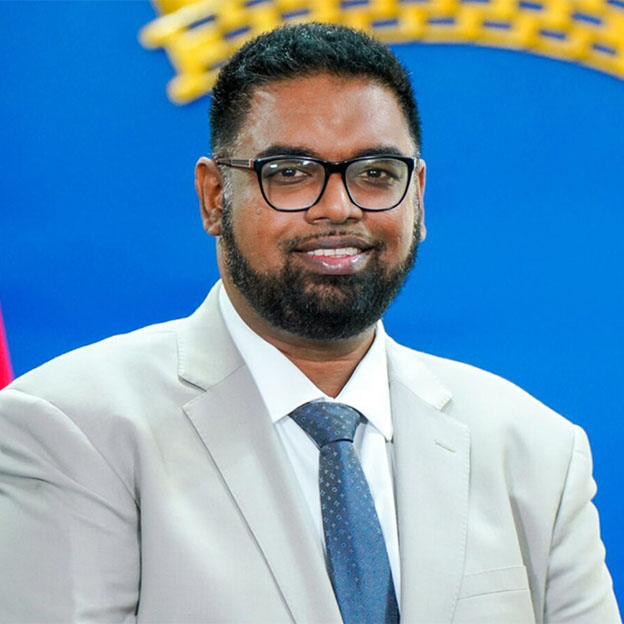– Ali revises cash payout
President Irfaan Ali yesterday announced a revision to his previously announced cash grant incentive, saying that instead of the one-off $200,000 per household payment, each adult citizen 18 years and older will receive a one-off cash grant of $100,000. To be eligible, recipients will have to show proof of Guyanese citizenship by way of national identification card or Guyana passport.
“I now wish to announce that, instead of the one-off cash grant of $200,000 to every household previously announced, my government will expand this benefit by providing a one-off cash grant of $100,000 to every adult citizen of Guyana who would have attained the age of 18 years as of 1st January 2024, with the simple means of verification being possession of a valid national identification and or a valid Guyanese passport,” Ali announced via a live broadcast on radio, television and the internet.
The President did not specify when the money will be paid but Minister within the Office of the Prime Minister Kwame McCoy who is responsible for communications told Stabroek News that the payout would begin soon as work to facilitate it had already commenced.
This newspaper understands that the modalities for payment are already being worked on, and that the payout process, because of the logistics of the country, could begin soon but take up to the first quarter of next year to be completed. However, one source said that the government wanted the payout to be executed as “quickly, transparently, effectively and efficiently as possible”.
The President yesterday said that his announcement last Thursday of a series of measures in keeping with his government’s aim of increasing disposable income, creating better opportunities, and building prosperity for all of the people of Guyana, which included the $200,000 per household cash grant, had to be revised because of a number of concerns raised.
“As is always the case with such initiatives, my government’s aim is to ensure ease of implementation, removal of barriers to access, and simplification of administrative procedures, always in the best interest of the population. It goes without saying that, in the normal course of implementing any government policy initiative, pre and post-testing and analyses are critical to ensure the greatest impact and highest level of efficiency in the delivery of service,” Ali said
“Over the past week, thousands of Guyanese have engaged myself and members of my Cabinet providing extremely favourable feedback on the measures I announced last Thursday, and tens of thousands have publicly expressed their welcoming of these measures. Particularly in relation to the announcement of a one-off cash grant of $200,000 to every household in Guyana, several persons have indicated to my government the complications they foresee in the implementation of this much welcomed benefit and fear of being left out,” he added.
He said that the complexities and some of the feedback that the government received included internal family conflict about access and internal distribution of the grant, a rush to transfer registration of utility meters, and a rush to prepare tenancy agreements all with the aim of establishing a distinct household, as well as other complications that might arise.
It is to this end, he said, that he instructed that the measures be reviewed to better cater for a wider cross section of the population and to ensure that those who needed the money most got it.
“Having regard to these challenges, whether real or perceived, I instructed last Friday that this measure be re-examined, with the aim of expanding the benefit while removing the challenges previously highlighted. I further asked that this reconsideration be guided by the following key principles: reducing the burden of administering the benefit; simplifying the procedures for accessing the benefit; improving ease of verification; minimising any potential conflicts that might arise; ensuring an open, transparent, verifiable system of delivery; and, expanding the benefit,” Ali explained.
In addition, he said that of paramount importance was ensuring equitable distribution amongst and within households and across the population at large.
The new $100,000 per adult measure, he reasoned, would substantially increase the $60 billion previously allocated for this measure.
In a sweeping address to the National Assembly last Thursday, Ali who also lambasted the former APNU+AFC government for broken promises and unveiled a range of initiatives to be funded from the country’s burgeoning oil wealth, announced the $200,000 per household payment.
He also announced free university education from January next year, a 50% cut in electricity charges before the end of 2025, a universal health voucher of $10,000 and a minimum wage of $100,000 per month in the public sector by the end of 2025 among other measures.
Speaking for over three hours at the Arthur Chung Conference Centre in what was a mini budget, the President also unveiled plans for what he called Vision 2030 – an early drive for re-election next year.
In a commitment to public sector employees, he announced that “no government worker would earn less than $100,000 monthly by 2025”, which is expected to increase total public sector income by over $1 billion. Additionally, a $10,000 monthly income tax deduction for parents for each child aims to alleviate financial burdens on families.
Meanwhile, the new cash grant distribution formula was not Ali’s only announcement yesterday as he pointed out that while he announced the abolition of tuition fees at the University of Guyana with effect from 1st January 2025, he was also doing the same for all government technical and vocational institutions across the country.
“In response to feedback received, I now wish to announce that tuition fees will also be abolished at all government technical and vocational training institutions, including all of the technical institutes, the Guyana Industrial Training Centre, and the Carnegie School of Home Economics,” he said.
This expanded measure, he stated, will benefit in excess of 3,000 more individuals in the tech-voc fields.










